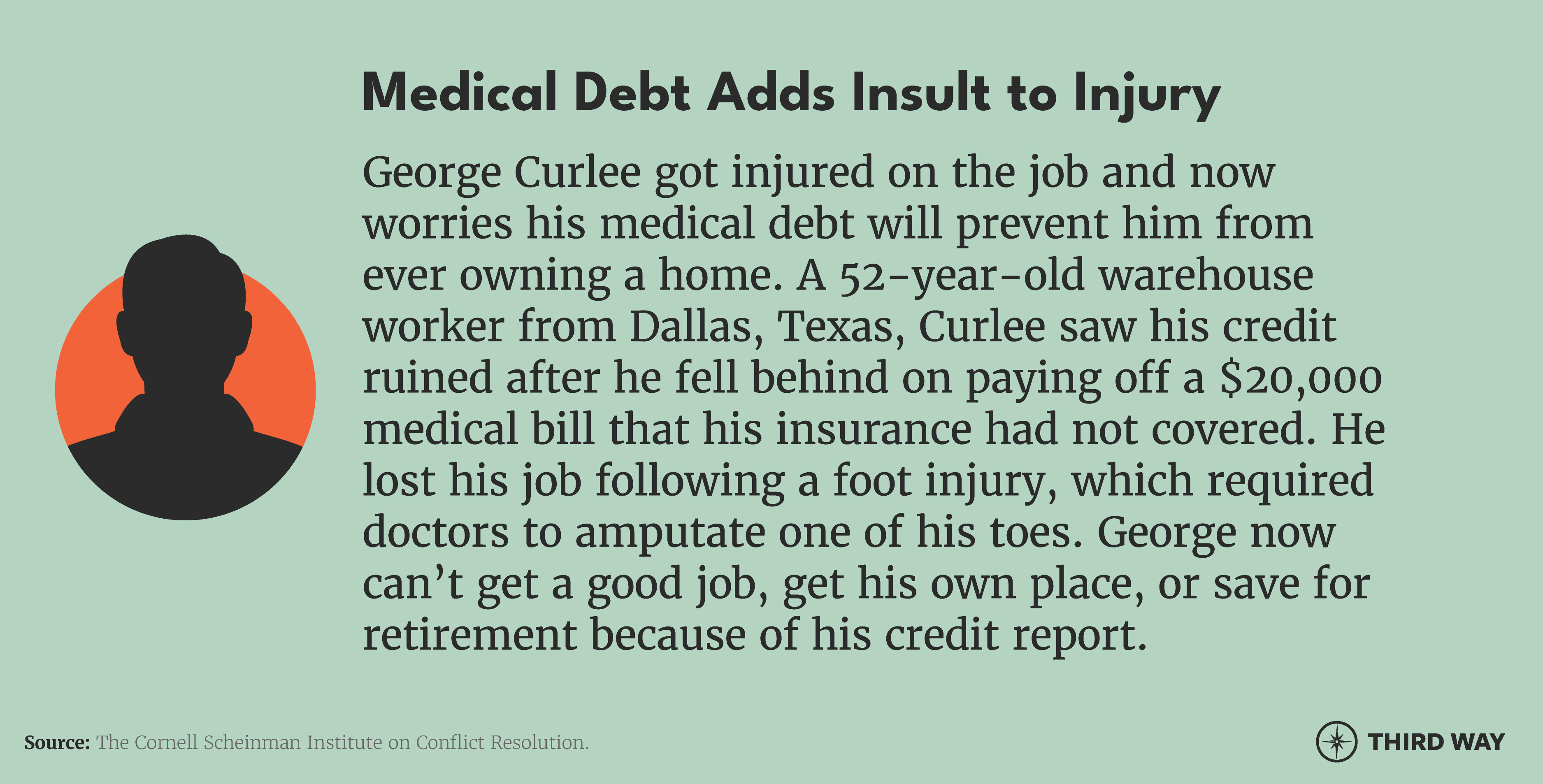Don’t Overturn the Medical Debt Rule

When medical debt ends up on consumer credit reports, it throws a wrench in the American way of life and leaves middle class families struggling. It can be a roadblock to buying a car, owning a home, or starting a business. Meanwhile, evidence shows that a medical bill on a person’s credit report is a poor predictor of a person’s likelihood of repaying a loan.
The federal government took action to remove medical debt from credit reports. However, 19 Congressional Republicans want to scrap these protections for American families. In this memo, we explain what’s happening with medical debt in the United States and three reasons why Members of Congress should oppose the GOP’s repeal efforts.
State of Play
The federal government finalized a rule in January 2025 that would require credit reporting agencies to remove medical debt from the credit reports of all Americans. The Consumer Financial Protection Bureau (CFPB) publicly announced the start of this rulemaking process nearly a year-and-a-half ago in September 2023.
This rule was set to take effect on March 17, 2025 and was estimated to impact the credit reports of 15 million Americans, raising their credit scores by an average of 20 points. This increase in credit scores could lead to the approval of approximately 22,000 additional mortgages each year.
However, the rule has come under attack from three sides:
- In early February, the Trump Administration directed CFPB to indefinitely suspend the effective dates of all its pending final rules, putting the medical debt regulation in limbo.
- A Texas District Court issued a 90-day stay, temporarily delaying implementation of the rule as it considers a legal challenge from a trade group representing collection agencies.
- Nineteen Republicans introduced legislation under the Congressional Review Act to overturn the rule and prohibit any substantially similar regulations from being promulgated in the future. This legislation is exempted from a filibuster in the Senate if passed within the first 60 session days after receiving the rule.
Why the GOP Repeal Effort is the Wrong Approach
Overturning the medical debt rule would be terrible for working families. Lawmakers should oppose the Congressional Review Act attempt for three key reasons:
1. Middle-class families and millions of other Americans are going to get hurt.
More than 100 million people struggle with medical debt. As of 2021, American families owed more than $220 billion in medical bills. Even among Americans who are not currently grappling with medical debt, nearly 60% worry that they will face medical debt if they suffer a major health event.
While medical debt impacts Americans across income brackets, it hits the middle class most often. Middle-income Americans, even when they have health coverage, often do not have the disposable income to cover high deductibles and out-of-pocket costs and end up bearing the brunt of this issue.
Those with medical debt tend to defer or skip needed health care in order to pay down existing debt, decreasing utilization of care, even as individuals are recovering from major health events. Most cancer patients end up in significant medical debt in the most vulnerable periods of their lives. Outside of the health impacts, families are also forced to make tough choices to cut household spending on food, clothing, and other items in order to pay off medical bills.
2. Medical debt doesn’t belong on credit reports.
Evidence shows that a medical bill on a person’s credit report is a poor predictor of a person’s likelihood of repaying a loan, yet still leads to the denial of thousands of loans each year. Medical debt is also often reported inaccurately or inflated on credit reports, unfairly punishing consumers.
Medical debt is also unlike other kinds of debt—it is usually unavoidable and unexpected. Even those who try to avoid incurring medical debt by maintaining health coverage are not spared. Three-in-ten adults with employer-based coverage have medical debt, along with one-in-three of those with Medicare or Marketplace coverage. Despite doing everything they can to pay for health care coverage and responsibly build credit, families are still forced to watch their credit scores tank when they cannot immediately pay back a large bill.
3. GOP repeal efforts have this issue wrong.
Some opponents of the medical debt rule argue that it will have spillover impacts on access to credit for Americans broadly. They assert that banks would limit access to capital out of fear that applicants’ credit scores are not accurate without the inclusion of medical debt. But this has already been proved wrong. In 2021, about 43 million people had medical debt listed on their credit reports. However, due to voluntary steps taken by the three largest credit reporting agencies to remove most medical bills from consumer reports, that number is now down to 15 million. Nearly two-thirds of credit reports listing medical debt have already been altered over the last three years without raising alarm bells, suggesting that any spillover impact of this rule on broad access to credit for American consumers would be minimal.
Others are asserting that the medical debt rule represents an eleventh-hour overreach from the Biden Administration. This is also inaccurate. CFPB announced this rulemaking process more than a year and a half ago, giving stakeholders and Congressional leaders an 18-month long heads-up. CFPB also facilitated a full 60-day public comment period on the proposed rule, giving stakeholders a public forum to voice concerns before the rule was finalized.
In fact, efforts to overturn the rule represent an overreach on the part of the 19 Republican sponsors. A successful vote on the joint resolution to block this rule would prohibit any similar regulation from ever being promulgated in the future—a move that would prevent any future Administration from taking action to protect millions of families’ ability to access credit.
Conclusion
Millions of hard-working Americans are saddled with medical debt that can tank their credit scores through no fault of their own. While policy changes that address the upstream causes of medical debt are clearly needed, this rule would provide immediate relief to the millions of Americans struggling with medical debt right now. The rule removes an unnecessary roadblock—putting American families closer to their dreams of owning a home or starting a business. If lawmakers are serious about their commitment to the economic success of American families, they should move to swiftly oppose any efforts to overturn this regulation.
Subscribe
Get updates whenever new content is added. We'll never share your email with anyone.

